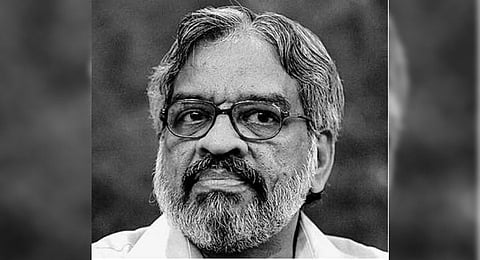

KOCHI: “What did you say? Beggars? Maybe we are poor...coolies...trolley pullers...but we are not beggars! … let it be the last time… if you dare to say that word once more, I will pull out your bloody tongue!”
T Damodaran was at his fiery best when he wrote this dialogue. And legendary actor Jayan unleashed a firestorm as he roared out the words in the film Angadi (1980). I was reminded of the clap-worthy punch dialgue watching Chief Minister Pinarayi Vijayan’s scientific adviser Padma Shri M C Dathan snapping at a journalist with utter contempt: “Don’t you have any other job? Why don’t you go begging?”
This went a notch above his boss’s infamous ‘kadakku purathu (get out)’ lashing at journalists some years ago. Apparently, the technocrat was enraged at being stopped by the police deployed at Thiruvananthapuram’s Central Stadium, where barricades had been erected in view of a political agitation against the government.
It was the journalists on the ground who alerted the police officers about Dathan’s credentials. However, on being pursued for a comment, he seemed to lose his ‘scientific’ temper. What’s appalling was the way the media fraternity and ever-righteous social commentators reacted to it. Zero outrage, save some feeble cries for an apology.
Dathan, no doubt, is an ace scientist and boasts an illustrious career, having been the director of the Vikram Sarabhai Space Centre. But, with all due respect, that does not give him the licence to degrade a journalist. It’s tantamount to demeaning a profession, the Fourth Estate.
Now, the problem with brushing this outburst aside as a ‘minor’ incident is that it would, perhaps inadvertently, encourage similar humiliation of reporters doing their job on the ground. There already exists an unhealthy trend of viewing or portraying reporters as some form of pests.
Yes, news hounds can get pestiferous at times. There may also be some unscrupulous black sheep, like in every other profession. But a majority of them diligently work round-the-clock, with malice towards none. They are just doing their job — one that deserves dignity.
I, for one, don’t want my little one to grow up wondering if my profession was a sordid one.
It would be well-appreciated if Dathan cares to gracefully apologise, as demanded by self-respecting journalists across Kerala. Dear sir, maybe we are pesky, but we are not beggars!
Well, moving on, there is always a positive in everything. For me, the positive was delving into the word ‘beggar’. Beggar has roots in Middle English, which was spoken from the late 11th century to the late 15th century. It was a period of significant linguistic evolution.
During that time, ‘begger’ came into usage for someone seeking alms or charity. It traces back Old French terms “begart” or “begard” that were initially used to describe members of certain religious orders who practised mendicancy, or the act of living by begging. And these mendicants came to be called ‘beguines’ (female) and ‘beghards’ (male). These usages, in turn, came from the Middle Dutch term ‘beggaert’, which again referred to members of a mendicant order.
Notably, the word beggar could have links to Indic usages of bheekari, bheek and bhiksha (alms) as well. It was a norm for mendicant monks to roam villages chanting “Bhavati bhiksham dehi (Mother, give me alms)”. It was considered as a ritual of self-effacement, extinguishing ego. Okay, time for me to go try vanquishing my ego. Wish you all an ego-free weekend ahead.
Beggar belief: “describes something so extraordinary that it’s hard to believe”
Beg the question: “to provoke a specific question (which typically follows this phrase); to assume or believe that something is true when its veracity is unverified”
A chance gone begging: “an opportunity that is not seized or acted upon”
I have to beg off: “to ask to be excused from an obligation or invitation”
Beg to differ: “to politely disagree with someone else”
Beg, borrow, or steal: “to acquire or accomplish something by any means necessary or available”
I beg your pardon, but (something): “I believe you are mistaken or incorrect; I beg to differ; I don’t agree with you on that”
Beg on bended knee: “to beg or plead for something submissively and with dramatic earnestness. Refers to kneeling before someone from whom one must beg for mercy or favour”
(Something) going begging: “to be available for one to take or claim”
Dry beg: “(slang) to try to obtain something by asking for it indirectly or vaguely”
A beggar on horseback: “someone who has become unscrupulous or irresponsible because of the sudden acquisition of wealth. The phrase alludes to several related proverbs, such as “give a beggar a horse and he’ll ride it to death” and “set a beggar on horseback and he’ll ride to the devil”, which suggest that an unexpected windfall is often misused or squandered”
Beggar (all) description: “to defy attempts at description; to be difficult or impossible to describe or explain”
Beggar belief: “to defy attempts at description; to be difficult or impossible to describe or explain”
Beggar thy neighbour: “referring to an economic policy that seeks to improve domestic economic conditions at the expense of other countries; hyphenated if used as a modifier before a noun”
Beggar’s bush: “ruin or devastation”
Beggars can’t be choosers: “suggests that when you’re reliant on others, you shouldn’t be picky”
Begging for trouble: “behaving in a way that invites problems”
Like a beggar at a feast: “(slang) out of place or in an inappropriate situation”
Beg the difference: Suggests that something is nearly indistinguishable.
Beggar’s banquet: “(slang) refers to a meagre or unappetising meal”
Beggar at the door: “(slang) someone who is overly persistent or demanding”